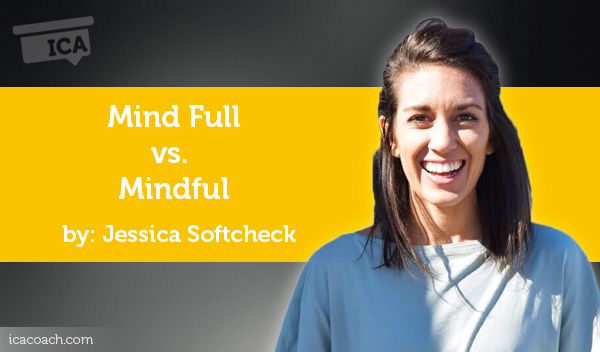
A Coaching Power Tool Created by Jessica Softcheck
(Goal Coach, UNITED STATES)
Breath is the bridge which connects life to consciousness, which unites your body to your thoughts. Whenever your mind becomes scattered, use your breath as the means to take hold of your mind again.― ThichNhat Hanh, The Miracle of Mindfulness: An Introduction to the Practice of Meditation
Mindfulness: the state or quality of being mindful or aware of something.
Mind Full: synonymous with words like “unfocused,” “chaotic” and “restless”
Mindfulness, even if only experienced briefly, is one of the greatest states of being. Mindfulness is a powerful tool to be used to separate us from our unruly, frustrating, limited thoughts and bring us into a place of stillness, quiet and most importantly, the present moment.
Mindfulness is the foundation of knowing what you want, how you want to achieve it/become it/etc, and the catalyst for creating authenticity in each moment of our lives. It is a tool that takes practice to sharpen and can move us out of stress and into awareness.
Having a “full mind,” is in opposition to being mindful. Having a full mind, or a “monkey mind,” like the yogi community describes it, is like living in a fantasy world one moment to the next – allowing thoughts to become detailed fabricated stories, and those stories to become our perspectives and realities. Having a full mind keeps us from seeing our truths, recognizing our patterns and eventually addressing them in order to set clear goals and begin living out our best lives.
To think in terms of either pessimism or optimism oversimplifies the truth. The problem is to see reality as it is.”― ThichNhat Hanh, The Miracle of Mindfulness: An Introduction to the Practice of Meditation
When we allow our thoughts to run wild, we can often feel “bogged down,” stressed and even disoriented – not knowing which direction we really want to travel towards. Our “busy is better” lifestyles have us living life in the fast lane, and consequently, we’ve forgotten how to slow down. Of all the thoughts we have each day, most are focused around the same things…and one that seems to come up quite often is fear. Fear keeps us in a state of “what could go wrong” instead of “how can this be.”
Luckily, mindfulness is a practice that can be taught to rewire the brain into taking things slower, recognizing when it’s out of control and setting the stage for more authentic choices. Should we pressure ourselves to achieve a state of mindfulness 100% of the time? Definitely not! For most of us, this is a really difficult skill to learn and takes a lot of practice!
Instead of viewing mindfulness as “a constant state of being,” let’s look at it as a tool to pull out whenever we notice our minds are:
As with anything we want to become better at, to sharpen the tool of Mindfulness, we’ll want to dedicate time to practicing! Here are some ways we can do that as coaches ourselves, as well as offer up to clients.
Tips for Shifting from Mind Full to Mindfulness
Understand that we CAN train our brains!
Create a plan of action
for when you recognize your thoughts are speeding out of control. This could be something like,
Many studies have proven deep breathing to reduce cortisol, our stress hormone, by up to 50%.
Meditate
Find what works for you and build upon it. Remember, mindfulness is a practice, and as you practice, you’ll get better and better at shifting from a full mind to a mind that is clear, calm and able to be settled.
Reflection for Coaches
- Knowing that mindfulness can be achieved through breath work and meditation, what kind of questions could you ask your clients to help them focus on these practices?
- What other ways can you come up with that could help your client slow down their thoughts/speech/impulses and shift them towards mindfulness?